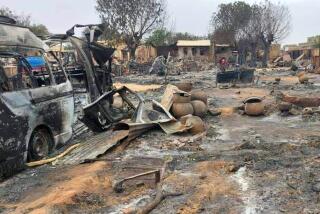Siege in Chad could reverberate in Darfur
NAIROBI, KENYA — As rebels in Chad fought for a second day to take control of the nation’s capital, analysts said Sunday that the outcome of the attempted coup could have far-reaching implications for the Darfur conflict in neighboring Sudan.
Foreign observers said Sunday that the military standoff remained unresolved, but early today a rebel spokesman told the Associated Press that the fighters had withdrawn from the capital, N’Djamena -- a sign that troops loyal to President Idriss Deby may be close to victory. Further details were not available because Chad’s phone lines have been cut.
The aid group Doctors Without Borders reported that scores of civilians had been wounded, mostly from errant gunfire. Looting has been reported in N’Djamena, and the French government evacuated at least 500 foreigners.
Rebels claimed to have seized control of the town of Adre along the eastern border with Sudan. Chadian authorities said the attackers had included Sudanese troops and had been repelled. Neither report could be verified.
A collapse of Deby’s government probably would be felt beyond Chad’s borders. Deby has been a big supporter of Darfur rebels in western Sudan, and his fall would threaten to tilt the balance of power in Darfur toward the Sudanese government in Khartoum, which is accused of backing the rebel assault now underway in Chad.
“This could be a big win for Sudan,” said Reed Brody, special counsel for Human Rights Watch, the international advocacy group. “The rebel alliance will be beholden to Khartoum. They will control one of the main access points and windows into Darfur.”
Chad is host to about 250,000 Darfur refugees who fled violence in western Sudan over the last four years. It also serves as an important gateway for humanitarian groups, journalists, human rights activists and peacekeepers, many of whom are unable to access Darfur through other areas of Sudan. Experts said that access could be at risk if a Sudan-friendly government suddenly took control of Chad.
In addition, Darfur rebel groups use Chad as a haven and launching point for attacks against Sudanese troops. Deby, who seized control of Chad in a coup in 1990, is from the same Zaghawa tribe as one of the main Darfur rebel groups. His government has supplied Darfur rebels with guns and allowed them to set up training camps along his border.
“If Deby goes, that could be a decisive blow for the Darfurian rebel operations in Chad,” said John Prendergast, co-founder of Enough, a grass-roots anti-genocide group.
A weakened Darfur rebel movement would complicate current mediation talks between the Sudanese government and guerrillas to end a conflict that has killed an estimated 200,000 people and displaced more than 2 million.
“It would shift the strategic balance in Khartoum’s favor and make it that much harder to get a [peace] deal,” Prendergast said.
Sudan has denied supporting Chadian rebels. Government officials in Khartoum could not be reached for comment Sunday.
But experts say Sudan played a key role in organizing Chad’s disparate groups of bickering rebels into the current coalition, the Union of Forces for Democracy and Development, that is fighting in N’Djamena. Sudanese officials pledged their support for an assault, but only if the rebels united. “Sudan knocked some heads together and obviously it worked,” Brody said.
Unlike a similar 2006 attack on N’Djamena, when small bands of confused rebels got lost on the streets of the capital, the current force is better armed and organized, experts said. The rebels are led by former officials who defected from Deby’s government after he amended the country’s constitution to run for another term.
The timing of the rebel attack is believed to be linked to the impending deployment of 3,700 European Union peacekeepers on a humanitarian mission to protect refugees in eastern Chad. The Sudanese government had pressured Deby to resist the international deployment, but he said he would accept the troops. EU officials said Saturday that the mission would be delayed.
If Deby’s government falls, the fate of the deployment is uncertain, raising concerns about the protection of Darfur refugees.
“There is a serious humanitarian catastrophe in eastern Chad, and Chad doesn’t have the means to deal with it,” said Paul-Simon Handy, an analyst at the Institute for Security Studies in South Africa.
But he predicted that rebels, if they seized control of the country, would be under strong international pressure to let in the European force. Already the United States and the African Union have condemned the rebel assault as unconstitutional. The AU is threatening to expel Chad if the rebels take power by force.
Handy said a new government probably would feel pressure to pursue democratic reforms and take other steps to appease the international community, including accepting foreign troops.
“For them, it will be a matter of political survival,” he said.
--
More to Read
Sign up for Essential California
The most important California stories and recommendations in your inbox every morning.
You may occasionally receive promotional content from the Los Angeles Times.










